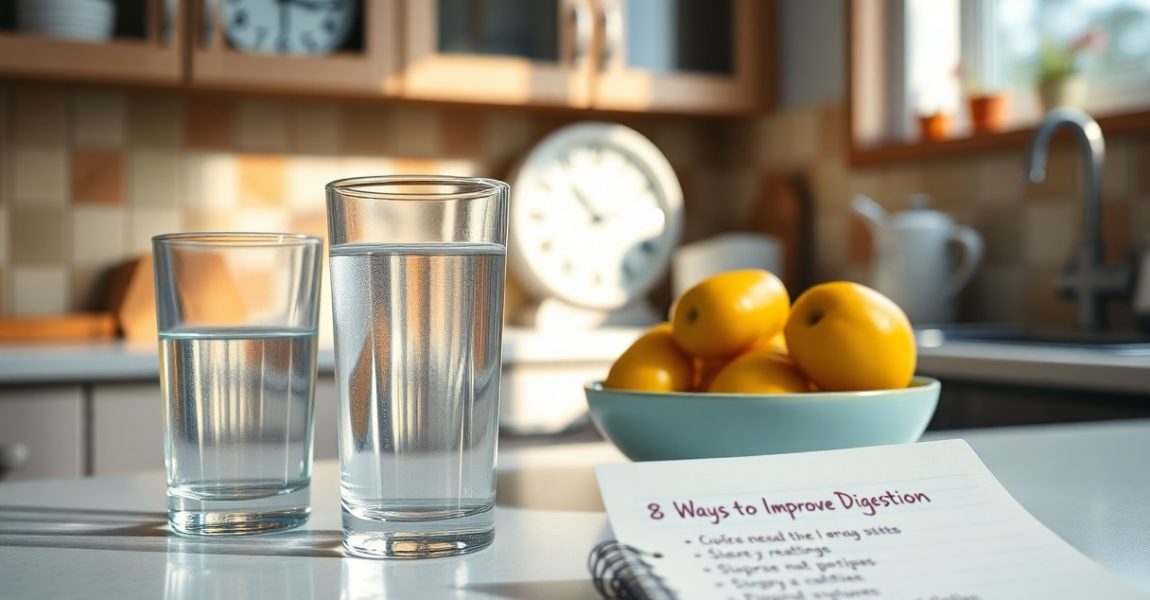
Digestion plays a vital role in your overall health, and timing your water intake can significantly enhance this process. By paying attention to when you drink water, you can optimize nutrient absorption and reduce discomfort. In this post, you’ll discover eight effective strategies that not only improve your digestion but also promote hydration. From drinking before meals to spacing out your water intake, these tips will empower you to take control of your digestive health.
Contents
- 1 Timing Matters: The Science Behind Water Consumption
- 2 Enhancing Digestive Rhythm: The Morning Routine
- 3 Hydration Strategies for Optimal Meals
- 4 Water Temperature: The Hidden Element of Digestion
- 5 Staying Ahead of Dehydration: Signs and Solutions
- 6 Conclusion
- 7 FAQ
- 7.0.1 Q: How can drinking water first thing in the morning improve digestion?
- 7.0.2 Q: Is it beneficial to drink water before meals?
- 7.0.3 Q: What effect does drinking water during meals have on digestion?
- 7.0.4 Q: How does consuming water after meals influence digestion?
- 7.0.5 Q: Can drinking water at night impact my digestive health?
Key Takeaways:
- Drinking water before meals can help prepare your digestive system, making it easier to process food.
- Hydration during meals aids in breaking down food and absorbing nutrients more effectively.
- Sipping water after meals can support digestion and prevent feelings of bloating or discomfort.
- Consuming water at various points throughout the day helps maintain optimal digestive health and function.
- Timing water intake around physical activity can enhance digestion and reduce the risk of gastrointestinal issues.

Timing Matters: The Science Behind Water Consumption
How Hydration Affects Enzymatic Activity
Enzymes are the unsung heroes of digestion, facilitating the breakdown of food into nutrients your body can absorb. These proteins thrive in a hydrated environment; without adequate water, your digestive enzymes can’t function properly. For instance, salivary amylase, which initiates starch digestion in your mouth, requires specific moisture levels to catalyze reactions effectively. Insufficient hydration hampers this process, leading to slower digestion and potential malabsorption of carbohydrates.
Moreover, the activity of gastric enzymes in your stomach, such as pepsin, depends heavily on the acidic environment maintained by water and other fluids. When you drink water at the right time—like before meals—you support the overall functionality of these enzymes, ensuring that food is broken down efficiently. Staying adequately hydrated creates the optimal pH balance your body needs to digest food swiftly and efficiently.
The Role of Water in Nutrient Absorption
Water plays a pivotal role in your digestive tract, specifically in the absorption of nutrients. After food is broken down, it travels through the small intestine, where vitamins, minerals, and other nutrients are absorbed into your bloodstream. If you fail to drink enough water, the absorption process can get hindered, leading to nutrient deficiencies. An example includes water-soluble vitamins such as B and C, which require a conducive, hydrated environment for optimal absorption.
Furthermore, adequate hydration promotes proper bowel function, preventing conditions like constipation that can obstruct nutrient uptake. By maintaining a good balance of fluids in your system, you’re ensuring that your body can capture those necessary nutrients effectively. Without sufficient water intake, you may find yourself missing out on key elements vital for overall well-being, such as calcium for bone health or iron for oxygen transport in your blood. Support a healthier gut with our water dispenser—making it easy to drink fresh water at the perfect times for optimal digestion
Enhancing Digestive Rhythm: The Morning Routine
Benefits of Water on an Empty Stomach
Starting your day with a glass of water on an empty stomach can set the tone for effective digestion throughout the day. This practice helps to flush out toxins that have accumulated during the night, allowing your digestive system to function optimally. Hydration first thing in the morning also triggers the production of gastric juices, which prepares your stomach for the food you’ll consume later. This boosts your overall digestive health, serving as a proactive measure against issues like bloating and discomfort.
Additionally, drinking water early enhances nutrient absorption by ensuring that your gut is hydrated and ready to break down food efficiently. Studies have shown that individuals who hydrate in the morning tend to feel less sluggish and experience improved energy levels, impacting not just digestion but overall body function. Feeling revitalized can also motivate you to make healthier breakfast choices that further support your digestive system. Improve your digestive health with our 250ml mineral water—ideal for drinking at the right moments to keep your system running smoothly.
Jumpstarting Metabolism with Warm Water
Opting for warm water in the morning can enhance metabolism, activating the digestive organs and promoting a swift and effective breakdown of food. Consuming warm water increases body temperature slightly which may lead to a temporary boost in metabolic rate. This effect can be particularly beneficial if you’re trying to manage your weight or enhance your energy levels. It is believed that drinking warm water can improve blood circulation, leading to better digestion and overall vitality.
Warm water acts as a gentle stimulant for your digestive system, potentially offering greater benefits compared to cold water. By drinking it in the morning, you prepare your body for the day’s digestion rather than shocking it with very cold fluids, which can inhibit digestive processes. The warmth enhances enzymatic activity in the gut, assisting in the proper breakdown of food. A healthy metabolism also makes it easier for your body to convert food into energy rather than storing it as fat.
Hydration Strategies for Optimal Meals
Pre-Meal Water Intake: Setting the Stage for Digestion
Prioritizing water intake before meals can significantly enhance your digestive process. Consuming a glass of water approximately 30 minutes before eating primes your stomach, helping to create an optimal environment for digestion. This practice aids in the production of digestive enzymes and gastric juices, crucial for breaking down food effectively. When you are sufficiently hydrated, your body can efficiently absorb nutrients, leading to greater energy levels and overall well-being.
It’s not just about the timing; the temperature of the water matters too. Studies suggest that drinking warm or room temperature water might be more beneficial as it helps in breaking down food faster than cold water. This can create a smoother digestive flow and enable your stomach to process meals without unnecessary sluggishness.
Post-Meal Hydration: A Double-Edged Sword
Post-meal hydration brings both advantages and potential drawbacks. While sipping water shortly after a meal can aid in the digestion process by softening food and assisting enzyme activity, gulping large amounts can dilute stomach acids. This dilution may not only hinder your body’s ability to break down food adequately but also lead to feelings of bloating and discomfort. The timing and amount of water you consume after eating play a pivotal role in achieving the desired digestive benefits.
Moderation is key when it comes to your post-meal hydration routine. Aim for small sips rather than large amounts, and consider waiting 30 to 60 minutes after finishing your meal before indulging in a larger drink. This will give your digestive system the opportunity to do its job without interference, ensuring you can fully enjoy the nutrients in your food without experiencing discomfort.
Water Temperature: The Hidden Element of Digestion
Cold vs. Warm Water Effects on Digestion
Water temperature can significantly affect digestion, with cold and warm water holding distinct properties. Cold water tends to constrict blood vessels, which can slow down the digestive process. When you drink cold water, your body expends energy to warm it up, diverting resources that could be used for digestion. This may lead to slower breakdown of food, discomfort, or even bloating, particularly during meal times.
On the flip side, warm water relaxes the digestive tract, improving circulation and aiding in the breakdown of food. Warm water can enhance enzymatic activity, making it easier for your system to absorb nutrients. Furthermore, it helps to dissolve fat deposits, which supports a more efficient metabolic process. Not surprisingly, many traditional cultures promote the consumption of warm water, especially during meals.
Impact of Water Temperature on Digestion
| Cold Water Effects | Warm Water Effects |
|---|---|
| Constricts blood vessels, potentially slowing digestion | Relaxes digestive tract, improving the digestive process |
| Requires energy to warm up | Enhances enzymatic activity for better nutrient absorption |
| May lead to discomfort or bloating | Helps dissolve fats for efficient metabolism |
Tailoring Water Temperature to Dietary Choices
Your dietary choices also dictate the ideal water temperature for optimal digestion. For a heavy meal rich in fats and proteins, warm water can facilitate the process more effectively than cold water. On the other hand, if you’re consuming a light meal, a glass of cool water might not disrupt your stomach’s normal functioning. Pairing the right temperature with specific foods can enhance your digestion, making your experience more enjoyable.
Incorporating water temperature into your dietary routine requires some mindfulness. If you tend to feel sluggish after meals, consider opting for warm beverages alongside heavier foods. Conversely, if your meals consist primarily of fresh fruits and vegetables, a refreshing glass of cooler water may be just what you need to rejuvenate your digestion.
Adapting Water Temperature to Meals
| Heavy Meals | Light Meals |
|---|---|
| Opt for warm water to aid digestion | Cool water can enhance freshness without disrupting digestion |
| Improves fat breakdown and nutrient absorption | Maintains normal stomach function and rejuvenates |
| Reduces post-meal discomfort | Perfect refreshment for fruit and vegetable dishes |
Staying Ahead of Dehydration: Signs and Solutions
Recognizing the Signs of Dehydration
Dehydration can sneak up on you, often without obvious indicators. Some common signs include dry mouth, fatigue, and a noticeable decrease in urine output. You might also experience unusual thirst or darker urine, which can signal that your body is low on fluids. More serious symptoms include dizziness, confusion, and rapid heartbeat, which indicate that you need to act quickly to restore balance. By being attuned to these signals, you can tackle dehydration before it affects your digestion or overall health.
Simple Strategies to Maintain Optimal Hydration
Integrating hydration into your daily routine can be straightforward and effective. Start by carrying a reusable water bottle with you, making it easy to sip throughout the day without needing to find a source. Additionally, setting reminders on your phone can help establish a consistent pattern for drinking water. Incorporating water-rich foods like cucumbers, oranges, and lettuce into your meals enhances hydration while also providing necessary nutrients. Another effective strategy is to begin each meal with a glass of water, ensuring you’re not only hydrating but also aiding in digestion.
Consistency is key; aim for at least eight glasses of water a day, adjusting based on your activity level, climate, and overall health. Keeping track of your water intake through apps or a simple journal can provide motivation and insight into your hydration habits. Lastly, if you’re engaging in intense exercise or spend long hours in the sun, remember to increase your fluid intake to compensate for the additional losses.
Conclusion
Drawing together the insights on how drinking water at the right time can elevate your digestive health highlights the significant role hydration plays in your overall well-being. When you consume water strategically—such as before meals, during meals, and after eating—you set the stage for improved nutrient absorption, effective digestion, and a more comfortable experience throughout the digestive process. By paying attention to your hydration habits, you empower yourself to enhance the way your body processes and utilizes the food you consume.
Incorporating these water-drinking practices into your daily routine can lead to noticeable improvements in how your digestive system functions. Whether it’s aiding in the breakdown of food, alleviating discomfort associated with bloating, or assisting in the elimination of waste, the timing of your water intake can make a meaningful difference. By making informed choices about when to hydrate, you take an active step towards optimizing your digestion and supporting your overall health. Embrace these changes, and you may find that your body responds positively, helping you feel more vibrant and energized.
FAQ
Q: How can drinking water first thing in the morning improve digestion?
A: Drinking water upon waking up helps to kickstart your metabolism and aids in flushing out toxins from the body. This first step stimulates the digestive tract and prepares your system for food intake throughout the day.
Q: Is it beneficial to drink water before meals?
A: Yes, consuming water about 30 minutes before meals can help to prime the digestive system. It hydrates the stomach and prepares it for food, which can enhance the breakdown of nutrients and optimize digestion.
Q: What effect does drinking water during meals have on digestion?
A: Drinking a small amount of water during meals can aid in food breakdown and absorption. However, it’s recommended to limit excessive water intake while eating, as too much can dilute stomach acids and slow down the digestive process.
Q: How does consuming water after meals influence digestion?
A: Drinking water after meals can help facilitate the absorption of nutrients and alleviate feelings of fullness. It can also assist in moving food through the intestines, promoting bowel regularity.
Q: Can drinking water at night impact my digestive health?
A: Drinking water in the evening may help with overnight hydration, which is vital for the digestive system to function properly. However, it’s advisable to consume only a moderate amount to avoid disruption during sleep.
- August 14, 2025
- Benefits
